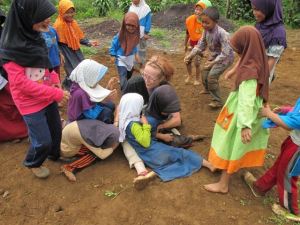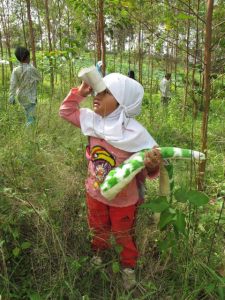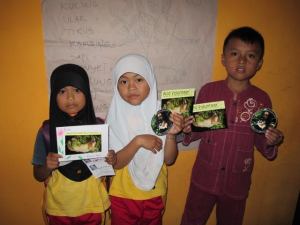I’ve been at Little Fireface Project for 14 months now and Nature Club has been by ‘baby’ for the past 10 months.
Coming from a tourism marketing background in Melbourne, Australia and no intense love for children, this was bound to be fun! I don’t play with children; I go out for dinner and enjoy champagne. I LOVE nature and wildlife, I hike and photograph with my husband, but never really hang out with kids. I’ve decided though that children are like cats … the more you keep away, the more they insist on sitting right on you whilst you try to work (the cats, not the kids). Now I look back though, I realise that children always sought me out at parties, weddings and family gatherings; and honestly I think it was because I was the most ridiculous ‘grown-up’ in the crowd and I genuinely enjoyed myself. I absolutely believe this is a very useful skill, so try harnessing that energy sometimes if you can… genuinely. It will be good for your soul too!
Tip# 1: Genuinely enjoy what you do … and the rest will follow.
So I figured, I’m creative, how hard could working with children be? I just need to make learning fun and get involved like I do at parties. Surely if they were having fun they would HAVE to learn and I, in turn, would enjoy it too right? Yes! That’s exactly what happened surprisingly enough, Phew!
 Tip# 2: Learning should be fun, not just for the children.
Tip# 2: Learning should be fun, not just for the children.
Restructuring Nature Club has been has been my favourite role at Little Fireface Project and I have enjoyed seeing the progress of the children during their monthly themed sessions and seeing the numbers continue to balloon.
Tip# 3: Ensure what you are doing is working. I do pre-post questionnaires for each month to gauge if my lessons are working.
Children join Nature Club every Friday for two hours of hands on and fun learning with a different theme each month. I cover all styles of learning but, without doubt the kinesthetic learning style is the favourite here in West Java! These children have a genuine creative flare and when given tasks they produce the most immaculate pieces of art with very little prompting.
So the last time I blogged we had just completed mammals, amphibian, insect and endangered species themes. We had a visit to the zoo and had heated debates about why animals are endangered. That was great and it made me realise that some of these children have a great passion for wildlife, even though, in general they are brought up to see wild animals in an indifferent light.
Tip# 4: Don’t assume that every child thinks the same (or learns the same)
Since then, we have learned all about our solar system and the night skies and that clouds are NOT planets. We played sensory games to show how nocturnal animals have adapted to live in darkness and we made ‘space playdough’ and made our own planetary system. It was messy and I looked like I had been to a street festival for many weeks later, with glitter in places I don’t dare mention.
 Tip# 5: Keep things interesting and mix it up … go outside, make puzzles, posters and puppets. This is done on minimal budget here and we recycle EVERYTHING.
Tip# 5: Keep things interesting and mix it up … go outside, make puzzles, posters and puppets. This is done on minimal budget here and we recycle EVERYTHING.
Our current Nature Club theme is ‘oceans’ and strangely, the children seem to have an excellent knowledge of the oceans compared to what they knew about forests when we first began. The ocean is about two and half hour drive from us and the forest is at the doorstep … literally, so this was a surprise for me. One 10 year old girl, Hismi, was up in arms over the killing of all of the sharks and fish. She said “killing sharks and fishing too much is really bad for the ocean’s health and we will all be sorry one day”. I came out of that class with the biggest of grins on my face.
Tip# 6: NEVER assume the children know less than you!
Next month I am sure will be everyone’s favourite theme when we learn about primates. There are some great primate activities planned and I cannot wait to be climbing, swinging, leaping and playing in the forest near where we live for the CHIMP-OLYMPICS (remember, I’m the ridiculous adult and will be the first to climb a tree like an orangutan). I’m also in the process of making a ‘Primate Quest – Q & A game’ which will be available for all organisations to use in their education programs.
Tip# 7: Think outside of the square. Try things. Sometimes they work sometimes they don’t!
Did you know that Little Fireface Project, Disney Worldwide Conservation Fund and Columbus Zoo funded the building of the new Nature Clubs rooms which officially opened this year? Since then, our classes have grown and grown. What started as a class of 10 is now 45 eager and ready to learn children. Forty-five LOUD and energy-filled children learning about nature and wildlife (did I mention loud?). The children have even decided that they want to start a tree planting club and want to plant trees at least once a month. Now that’s a win!
 Tip# 8: Reward effort … small stickers or cards go a long way. We have attendance awards every two months.
Tip# 8: Reward effort … small stickers or cards go a long way. We have attendance awards every two months.
Once more, I am so proud of my personal achievements here and particularly with Nature Club. I only have three months left on the ground here, and then we are off to Europe via Central and South America, hopefully to do more environmental education with organisations along the way. Now there is something I NEVER thought I’d say.
Tip# 9: Take a leap of faith, whether it be in environmental education or life!
I do believe a solid foundation has been set for future environmental education endeavours here and I just know Little Fireface Project will continue with the wonderful work they have been doing.
Tip#10: Get out and do it!.. It just might change your life and someone else’s too.
Sharon Williams – Project Coordinator/Environmental Education Manager
